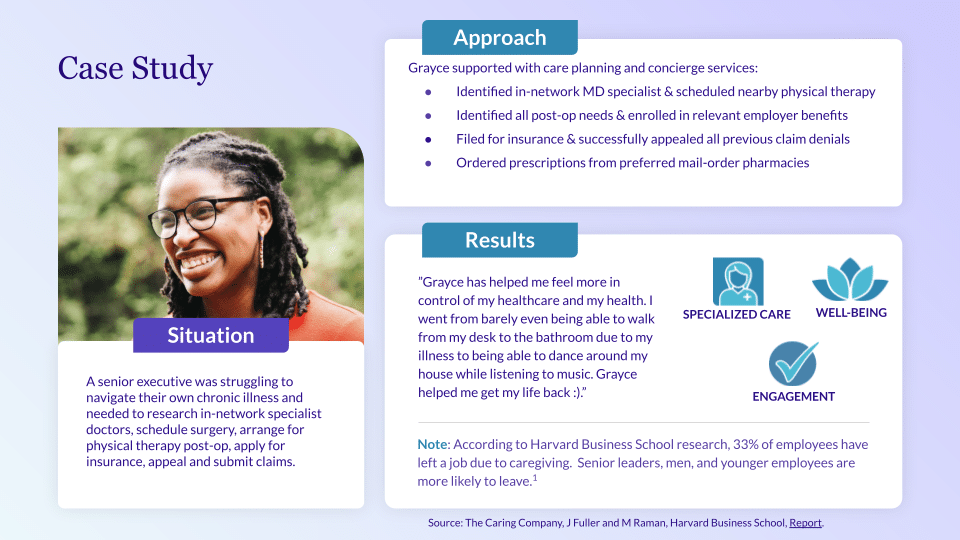Meet Jane: Neurodivergent Advocate and Community Leader
Grayce helped Jayne connect with other parents facing a neurodivergent diagnosis and build an empowering community.
Caregiver stress increases healthcare costs, but an evidence-based approach to family care benefits can reduce stress and retain talent.

Two studies demonstrate the rising need for caregiver employee benefits. First, a groundbreaking MetLife study on working caregivers found family caregivers have 8% higher medical costs. If that wasn’t enough, a Blue Cross Blue Shield report found that caregiver health outcomes are 26% worse than the benchmark population.
The studies found stress is directly responsible for increased depression, diabetes, hypertension and pulmonary disease regardless of age, gender or work type. For employers, these health problems show up in your rising healthcare costs — especially among employees and families navigating complex care at home like cancer, kidney disease, musculoskeletal, and heart conditions.
The good news? Family care support can reduce healthcare costs and improve caregiver well-being.
Multiple studies show supporting the family in patient care reduces the physical and emotional symptoms that weaken caregiver health and increase health care costs. That’s the first prong. What’s more, this approach improves patient outcomes. That’s the second.
Patients and families are confused about how to navigate healthcare and other legal or financial systems, unsure about what to do or how to make the right decisions, and working in role for which they’ve had no training. In short, they’re stressed.
However, three things happen when you engage the patient and family in the care journey. Families save time, money, and have peace of mind.
Take the below case study from a member navigating the health care system in the U.S. for themselves. They needed a second opinion, surgery, post-op planning, and help with filing insurance claim appeals.

In short, this member needed help feeling confident they had the right care team, knowing what to do post-op with a care plan, and getting it done with a concierge. We see it all the time. Grayce helped remove those barriers to care through expert guidance, research and vetting, planning, and implementation.
In multiple studies, research has found:
If you’re looking at getting a handle on the healthcare costs for your organization – family support brings down healthcare costs in two ways: by improving the health of your employees caregiving at increased risk for developing or worsening depression, diabetes, hypertension and pulmonary disease, as well as reducing readmissions and acute care needs of patients or dependents on your health plan.
But caregiving impacts your business’ bottom line in indirect ways, too. When you consider that caregiving is the second-most-cited reason for leaving the workforce — after early retirement — the cost of caregiving due to replacing talent becomes even steeper.
Our approach is evidence-based, HIPPA compliant, and modeled to engage the whole family — both patient and caregiver — to reduce stress and deliver results.
As an innovative care navigation platform, Grayce helps families worldwide find answers to their most complex caregiving questions – including, financial, legal, logistical, and emotional. Using Grayce means working with an expert to develop a plan for the present and a path for the future through every stage of the care journey. That’s why when asked about stress levels, 75% of members report a reduction in stress from moderate-extreme down to mild-moderate after working with Grayce. We’re proud to have a 4.96+ (out of 5) star member satisfaction rating.
Grayce integrates into your benefits ecosystem and boosts the utilization of the other benefits you are already offering. We have cross-referred 58% of members to relevant benefits they didn’t realize their employer had available.
In a client study of 18,475 employees, the 2024 Economic Impact and Value Report by Grayce shows the financial impact of providing comprehensive family care support can produce a 6-to-1 return on investment by reducing turnover.
To learn more about offering family care support, please contact us.
Sources

Sign up to receive the latest resources and updates from Grayce.